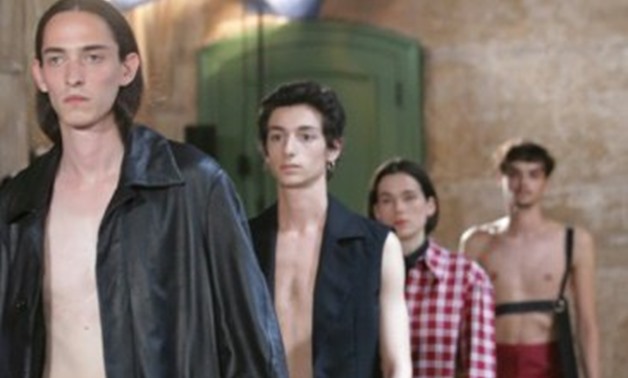
Models present creations by Kurdish designers Namacheko during the Men's Fashion Week in Paris, created by brother and sister Dilan and Lezan Lurr
Paris - 24 June 2017: Dilan Lurr and his sister Lezan often ask themselves where would they be now if their parents had not left Iraq when they were children.
Would they be fighting against Islamic State like their cousins back in Kirkuk?
What is almost certain they would not be showing their first collection at Paris fashion week sandwiched in Friday's schedule between storied brands such as Berluti and Commes des Garcons.
But the brother and sister who were brought up in Sweden have far from forgotten the historically Kurdish city they left behind at age nine and four.
They started their Namacheko menswear label in 2015 "as a way of expressing our thoughts about our background," said 28-year-old Dilan.
"We grew up in a very free space in Sweden, where we could study and dream. Our parents are religious but they have always been very liberal with us."
But imagine "how horrible is it if even in your dreams you cannot be free," he told AFP.
"You always think where would I be right now if we had stayed in Kirkuk," he said of the city which was only saved from falling into IS hands by the swift intervention of Kurdish peshmerga fighters.
More than mere fashion, the Lurrs' first collection is a subtle meditation on their lives between Sweden and Kirkuk, whose mixed population is about to vote on whether it will join Iraq's increasingly independent Kurdish autonomous region.
"We talk a lot with our cousins there and they think it is mind-blowing how we live," said Dilan, who like his sister studied engineering before coming to fashion through art.
"We travelled between Sweden, Belgium and Paris to work on the collection and they cannot believe how we go from one country to another as if we were just taking a bus."
Their cousin Heresh, who modelled for them in a video Dilan shot in the flaming oilfields that surround Kirkuk, is now fighting IS on the frontline.
"We feel our great freedom when we speak with our cousins," Dilan said.
"When we went to the frontline we were amazed to see so many older men from their 50s onwards with their bellies and everything were fighting. But these guys do not run when ISIS comes. They know the drill. Some of them have been fighting since the 1970s.
"You imagine these super fit, highly-trained peshmergas but in reality there are a lot of fathers and grandfathers who are out there for three days and then home for a week."
Cleverly disguised peshmerga jackets -- white rather than regulation olive green -- popped up in the Lurrs' Paris show -- itself a labour of love.
"We begged and borrowed to put this show on. No one has been paid," said Dilan after the showing.
The Lurrs are at pains to point out that Namacheko's cashmere and silk creations are more an expression of their own personal journey as they "adapted to Sweden and it adapted to us".
Lezan told of how when she arrived in Sweden she was sent to a church kindergarten rather than a state one by her pious parents where "my favourite storybook became the Bible".
"I was the only Muslim there yet I loved its stories. My parents were very happy about it and even read it to me. They were very open and liberal with us, within limits."
Despite their preoccupations with exile and belonging, Dilan said there are few overtly Kurdish influences on their clothes, although there are touches for those with the eyes to see.
"I don't want the collection to be Middle Eastern but we added small touches and references. Some people see it, others don't."
But the Kurdish experience is clearly there in the Lucio Fontana slashes in the backs of some coats "exposing the suffering and melancholy inside", Dilan said.
Nevertheless, the siblings refuse to be called refugees, saying their parents chose to move to Sweden in 1997 for a better life.
The Kurds were then being ruthlessly persecuted by the Iraqi dictator Saddam Hussein.
In fact, their father, a goldsmith, had to bribe officials to remain in Kirkuk as many other Kurds were forced out in the 1990s so Saddam could tighten his grip on its oilfields.
"We were not running for our lives. But yes, it definitely wasn't a great time to be Kurdish," Dilan said.


Comments
Leave a Comment